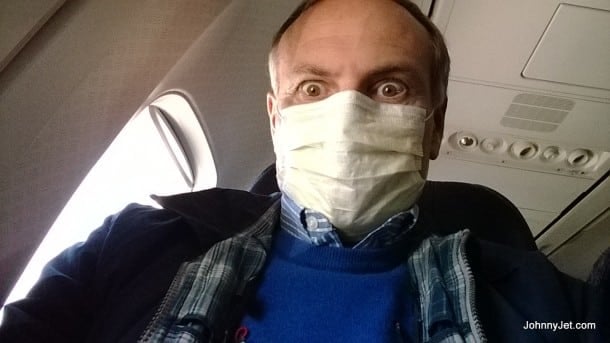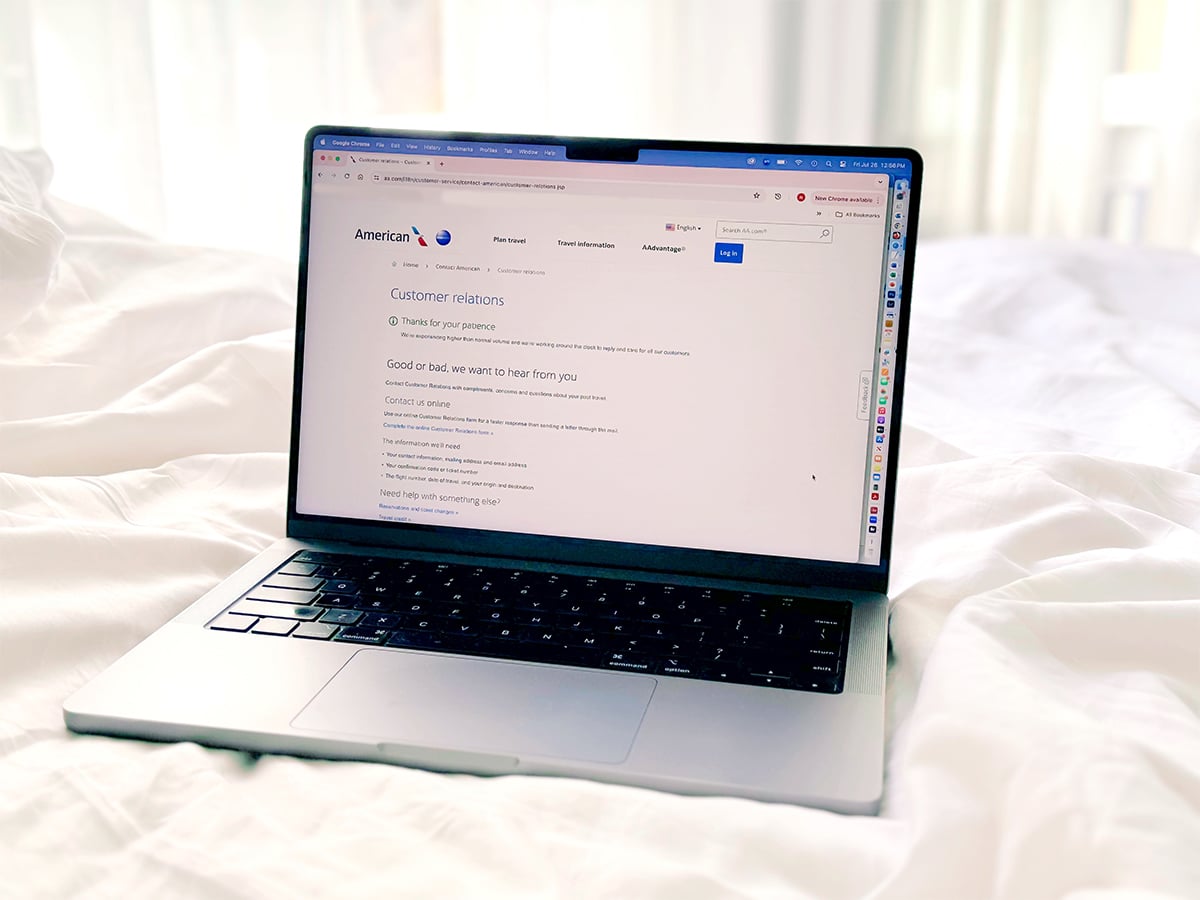
This post was updated on October 25, 2021. It was originally published in 2012.
There’s nothing worse than being sick, except for being sick away from home. And unfortunately, it has happened to me multiple times. The good news to come out of these nasty bugs is that I learned some valuable tips—the 11 below—that I can now pass on to you to help you minimize your own risk on the road this season.
1. Get vaccinated
Every frequent traveler knows they should get a flu shot each flu season and hopefully you’ve already gotten your Covid vaccine. Here are some places to get a flu shot.
2. Use disinfectant wipes
When I travel I’m almost borderline Howard-Hughes-insane about germs – and that was pre-pandemic. Covid just heightened all of my efforts to sanitize things. I constantly wash my hands, use hand sanitizer, make a conscious effort not to touch my mouth, eyes or nose, and wipe down plane seats and hotel rooms with disinfectant wipes (I recommend Clorox or SONO). When I’ve been lazy, I’ve paid the price for it. Don’t make the same mistake.
3. Pack a mini first aid kit
I always carry a mini first aid kit in my carry-on (Tylenol in particular has brought me instant relief in the past). Here’s what I pack in my carry-on first aid kit. You can get most of this on the road but why wait? And trust me: When you get sick you’re going to wish you packed this stuff before you left.
4. See a doctor
The one thing I forgot to replenish in my first-aid kit last time I traveled was Amoxicillin, and that hurt because I got an upper respiratory infection, so I needed a doctor. All hotels can arrange for one, so call the front desk and inquire, or make plans to see one back home. Last time, I emailed my doctor from the road and saw him as soon as I arrived back in the United States. Some locations like where I live in L.A. offer doctor house or hotel calls by using the Heal app. Search your location for similar apps.
5. Travel insurance
Before you leave home, check to see if your health insurance covers you during your travels (especially international). If not, buy travel insurance but be sure to always read the fine print and find out what’s covered when it comes to Covid. Travel insurance is not expensive and provides great peace of mind. I use InsureMyTrip.com, which lets you call or book the best plan for a particular trip online using one of their 24 travel insurance brokers. However, I always go with Allianz since they’re the largest and in the past, I have worked as one of their brand ambassadors.
6. Rest
I’m pretty sure one of the reasons I got shingles back in 2015 was that I was traveling too much and not getting enough sleep. I could feel my body getting worn down. When I finally got sick, I was smart and canceled everything on my agenda to allow myself more time to rest.
7. Don’t spread your germs and wash your hands
If there’s one thing Covid has taught us, it’s: If you’re sick, just stay home. No one wants to be around a sick person. If you have to go to work or catch a flight then wash your hands more than usual, use hand sanitizer and cover your mouth when you cough or sneeze. According to the CDC, this is the proper way to wash your hands:
8. Wear a surgical mask
Well before the pandemic I wrote, “In Japan everyone wears a surgical mask when they’re sick. Why can’t we bring that tradition to America or, better yet, the rest of the world? Who cares if people think you look like a freak? As you can see from the photo above I put on my mask on a flight not because I was sick but because the passenger next to me was not wearing one and coughing without covering his mouth. After I put on my mask and gave him my “crazy eyes” he got the hint.”
9. Use disinfectant wipes AGAIN
Yes, I’m repeating this for a reason. Obviously, it makes sense to disinfect a surface before you touch it. But what many people don’t think about is disinfecting the surface again after you’ve touched it. It’s the same principle as wiping down your equipment after you’ve used it at the gym. So if you’re sick when you fly, give everything you’ve touched (overhead compartment latch, seatbelt, in-flight entertainment screen and controls, tray table), a quick wipe down when you land. Same goes for everything in your hotel room if you’re sick there. Let’s stop the madness of passing germs on.
10. Drink lots of fluids
When you’re sick, during flu season or any other time, you should be drinking lots of fluids, and I’m not talking about alcohol or caffeine. When you travel, you should drink even more. I drink gallons of water when I’m sick on the road. I also carry those tiny packets of Emergen-C that I can pour into a bottle and shake or mix in a glass of water. I was recently sick in Palm Springs and my buddy, former travel writer and Palm Springs resident Chris McGinnis brought over some Liquid I.V. for me and suggested I take it, along with a steamy hot shower because he thought I might have been dehydrated. You know what? He might have been right. I added a single packet of Liquid I.V. to my water and started feeling much better within a couple of hours. Now I keep it in my first aid kit.
11. Change your plane ticket
One of the best things to come out of the pandemic is the airlines finally eliminating most of those ridiculous change fees. I always thought that airlines should’ve made an exception for people who are sick because the metal tube just makes them sicker and spreads their germs to others. Fortunately, now they do so take advantage of it. I’ve changed my LAX to JFK flight five times in the past month because either I or one of my family members have been sick.
I hope you find these tips/tricks to be helpful. Let me know what works for you or if I’ve missed anything, and here’s to happy, healthy and safe travels this Covid/flu season and beyond!









Great tips! I have been wearing a mask on airplanes as a preventive measure, since the outbreak of SARS. I am still hoping it will catch on here too.
Sorry you didn’t feel well. Getting sick is horrible. I like #6 and #8 (I don’t get enough rest either). I wish more people would try #11. I hate it when sick people are sitting around me hacking up lungs on an airplane.
Hopefully, you both are feeling better now.
You might try chewing gum containing Xylitol. It is said that Xylitol coats your mucous membranes preventing germs from invading. I have used this tip ALWAYS when I fly and have never contracted an airborne illness. HOWEVER, be sure to use a gum that does NOT have Manitol or Sorbitol in it, ONLY Xylitol. They cancel the effectiveness of the Xylitol. a good brand of gum and “breath mints” is SPRY. They are usually carried bty health food stores and perhaps your dentist. THANKS for your above TIPS. Can use all the help I can get as I am NOT getting any younger and want to continue to travel.
Nice brother in law you have. Congratulations!
If you’re going to areas where you anticipate problems, it’s worth noting that the antibiotic that you are carrying for respiratory issues may not be the best thing for intestinal problems–and of course both can strike! Ask your doctor in advance but for example when we go to South Asia we carry both azithromycin and cipro. And naturally in many parts of the world you can buy high quality drugs locally without a prescription.
We travel a lot and are happy to share these tips:
1. Sniff warm salt water preventively and during a cold. I learned this from an article interviewing a French perfume “nose” whose job is to sniff scents for the making of perfume. He said he could not afford to get a cold and so he prepares a warm salt solution and sniffs it into each nostril each morning. It is amazing how it cleans out the sinuses! I do it only during the cold and flu season before bed so that it sits in the nose all night. I also do it if I feel a cold or sore throat coming on or before a flight. You make a fairly strong solution, sniff it into both nostrils and then gargle with the remainder. Since following this routine, I rarely get sick and if I do, it only lasts a couple of days.
2. At the airport or anywhere there are lots of people, if someone starts coughing or sneezing, move immediately away and keep your mouth closed. My physician daughter says 6′ is the distance to keep from a sick person.
3. Put a bit of vasoline into your nostrils before you head for the airport.
Travel healthy!
Great tips! Thanks!
Another tip is to st
Remember to sterilize your toothbrush every time you use it – pour alcohol (mouthwash, etc.) over it, don’t dunk. Or, buy a couple of six-packs of brushes for $1 and trash the brush after using. Otherwise, you’re reinfecting yourself.
Hope you’re feeling better.
Good to know and thanks for the tip!
I’m traveling next month to California and I’m terrified of getting stuck next to someone whose sick on the plane. Your tips will surely help me try to avoid catching a cold this season while traveling!
Hey Johnny, thanks for your valuable tips. This will help all travel lovers from around the World. If we book a Doctor on call hotel or resort, that will be more helpful for our travel days.
Because of you, Johnny, I am more careful on planes (& at work). I carry disinfectant wipes soaked with some alcohol in a baggie and I wipe EVERYTHING that I could touch on the plane. Once a seatmate told me, that that it was a good idea. She don’t know, your germs make me (& everyone else sick).
I think the mask is a great idea but then when people see you they would think, why is he/she wearing a mask? What have they got? But its more like what do YOU have.
No I don’t believe sharing is caring :).
Imagine just one person oa plane flying from NY to LA. They have a cough and every time they cough, sneeze or touch something within the cabin; to and from the bathroom/galley. They are spreading hundreds of germ droplets on everyone they are passing.
But they just don’t have a cold or the flu, they have some rare virus they didn’t know they were carrying and now everyone on they plane gets infected and they go home or are going to a family get-together.
1 person leads to 200 people leads to 700 people leads to 57,000 people leads to …. the world. You know where this is going. All because one person didn’t stay home.
Yes, I’m paranoid about germs but can you blame me? I want to be the 1% of the population that survives this.
See what you started Johnny :D
Unfortunately anti-bacterial wipes don’t affect the flu, which is a virus. Frequent and thorough conventional hand washing is best. Research shows that flu vaccines are only 50% effective for most adults and only 10% effective for seniors – generally a waste of time and money. Most problems with colds and flu come from secondary infections that involve bacteria, and there is a good oral vaccine against the most problematic ones. It doesn’t stop you getting a cold but it helps avoid strep and other throat and chest infections. It is called “Buccaline” and is produced in Switzerland. If you search for it online you should find a source. I always take it prior to winter and also a month before any long distance international air travel.
Ok, I’m going to mildly disagree with you about the surgical mask. In Japan you can get away with it. But I can attest from first hand experience that the surgical mask may not always work out the way you want it to.
Earlier this year I was coming back ROR-GUM-HNL-SFO and when we got to Guam we had to go through passport control (US territory) and I had put my mask back on because international terminals can be such germ pools. But before we disembarked from the plane one of the flight attendants told me that if I wanted to get through passport control free of hassles I should remove it because, even though I was healthy, the airport people will view me as sick and pull me aside for further investigation. Having gone through GUM’s security before and knowing how slow it can go, I decided to remove the mask.
So the lesson here is, wear it when your sick, absolutely. But if you’re healthy keep in mind that to others you are giving off the appearance of being sick and that may have unintended consequences.
As a registered nurse (California) I would have given the mask to your seatmate instead. The yellow mask should be used by the ill person, it is NOT very effective in preventing respiratory infection if you are the one using it instead of the person who is coughing.
The N95 mask (not the yellow type of mask you used) is used by health care professionals when they are in close contact with a patient who is on respiratory isolation, but it is so effective that I can only use it for 10-15 minutes tops, then I have to step outside the patient’s isolation room to breath some fresh air.
Great tips – especially the advice about not touching your eyes/nose/mouth. I see people itching their eyes: It is a sure way to get a bug. I only log about 25,000 miles a year, but wiping down surfaces coupled with the liberal use of hand-sanitizer has helped me and my 89 year old Mom (who can not afford to get sick) remain cold/flu free even when flying. Don’t touch your eyes/nose or mouth unless you have just washed your hands!
I always bring a few TBSP of salt with me for a quick gargle if I start to feel a tingle in my throat. Also the homeopathic remedy Oscillococcinum is a wonderful flu preventative if you use it immediately when you feel your first symptoms. Sometimes I take it just before a flight, just in case. Never travel without it.
Actually that’ s a piece of advice that comes from a friend of mine: he just eat some propolis (a natural product from bees) every day during wintertime and he swears he never gets the flu.
I’ ve never tried it so all bets are off.
Smart idea nothing worse than being stuck next to
a person who is coughing and sneezing…I will take
a mask this year…thanks for the tips……
It’s better not to travel during dangerous flu season.
Eating lots of garlic and onions is supposed to help (imagine the odor!)… Also: drinking vodka or other similar strong alcohol drinks is said to help prevent flu.
I always carry Mucococcinum; for me it is the only Coccinum that works. It’s more expensive than the Oscillo, but is more effective. I also use it preventively during flu season – one tab per week.
As someone who visited Japan practically yearly, I was saying the same thing about masks. Since most of the population has been using masks for decades, they’ve got a great amount of selection and I’m glad I picked one up back in 2013. It’s so comfortable i sometimes forget I’m wearing it.